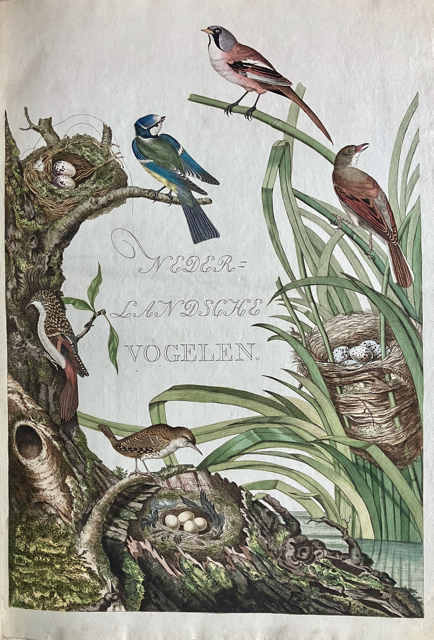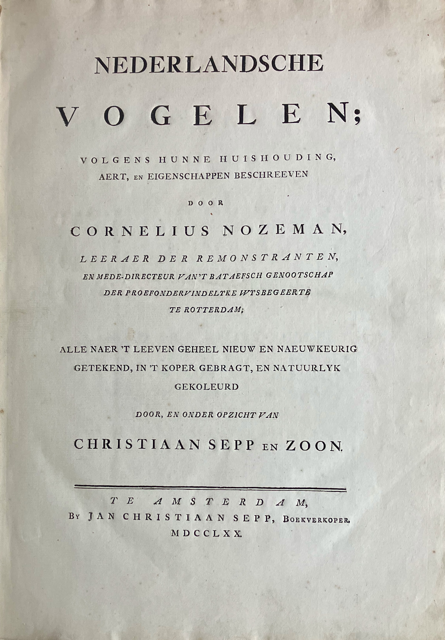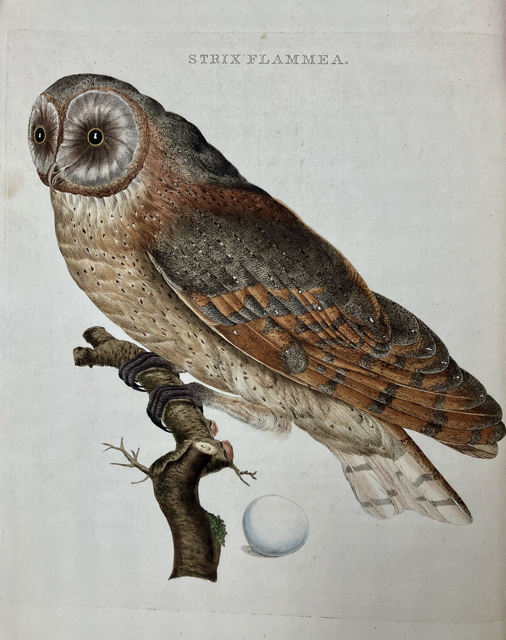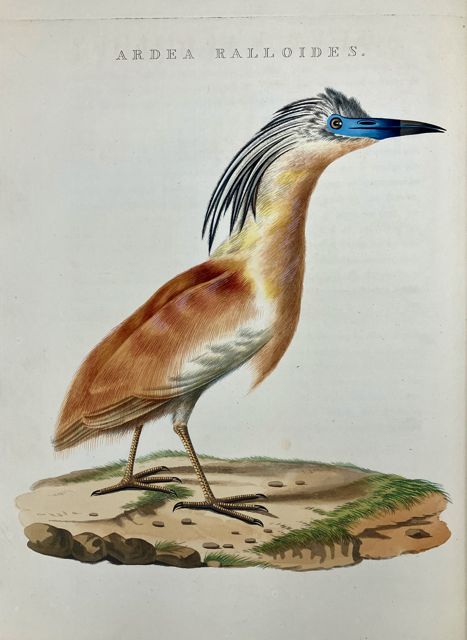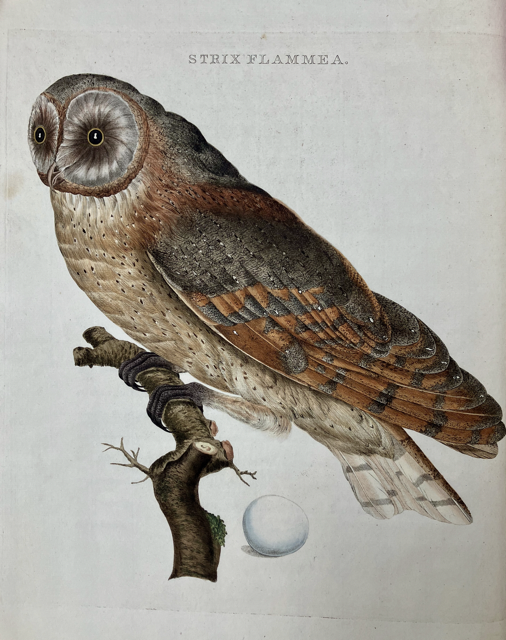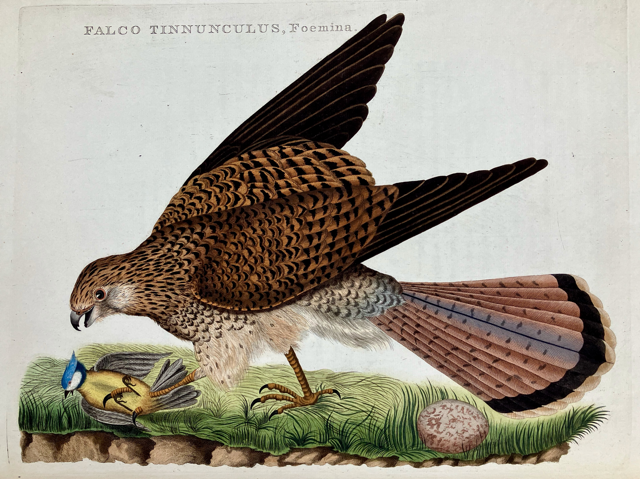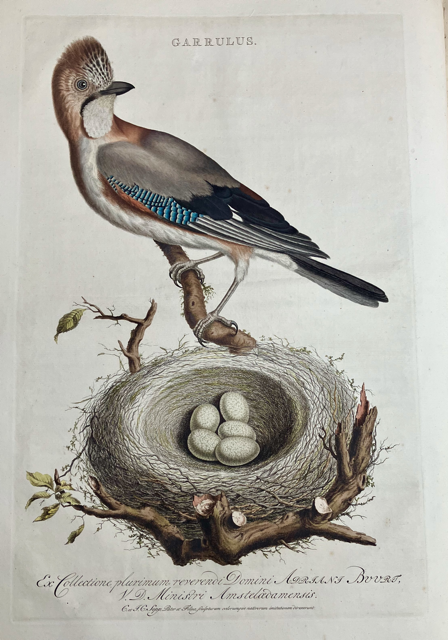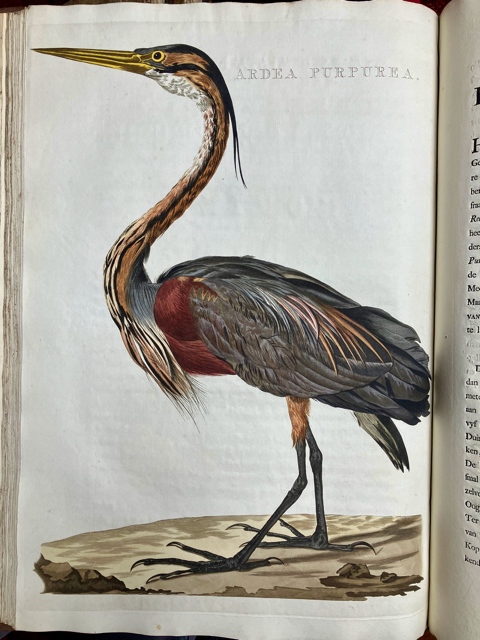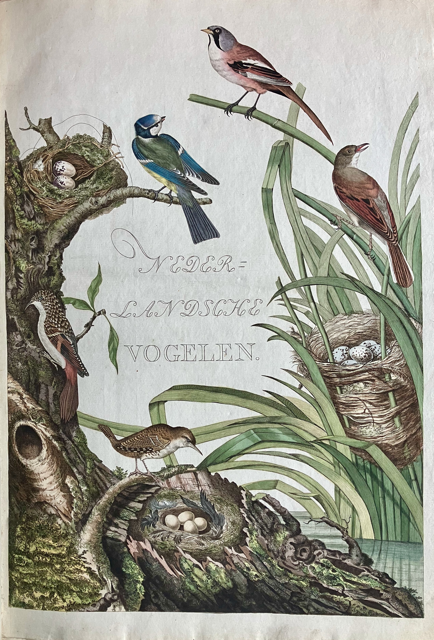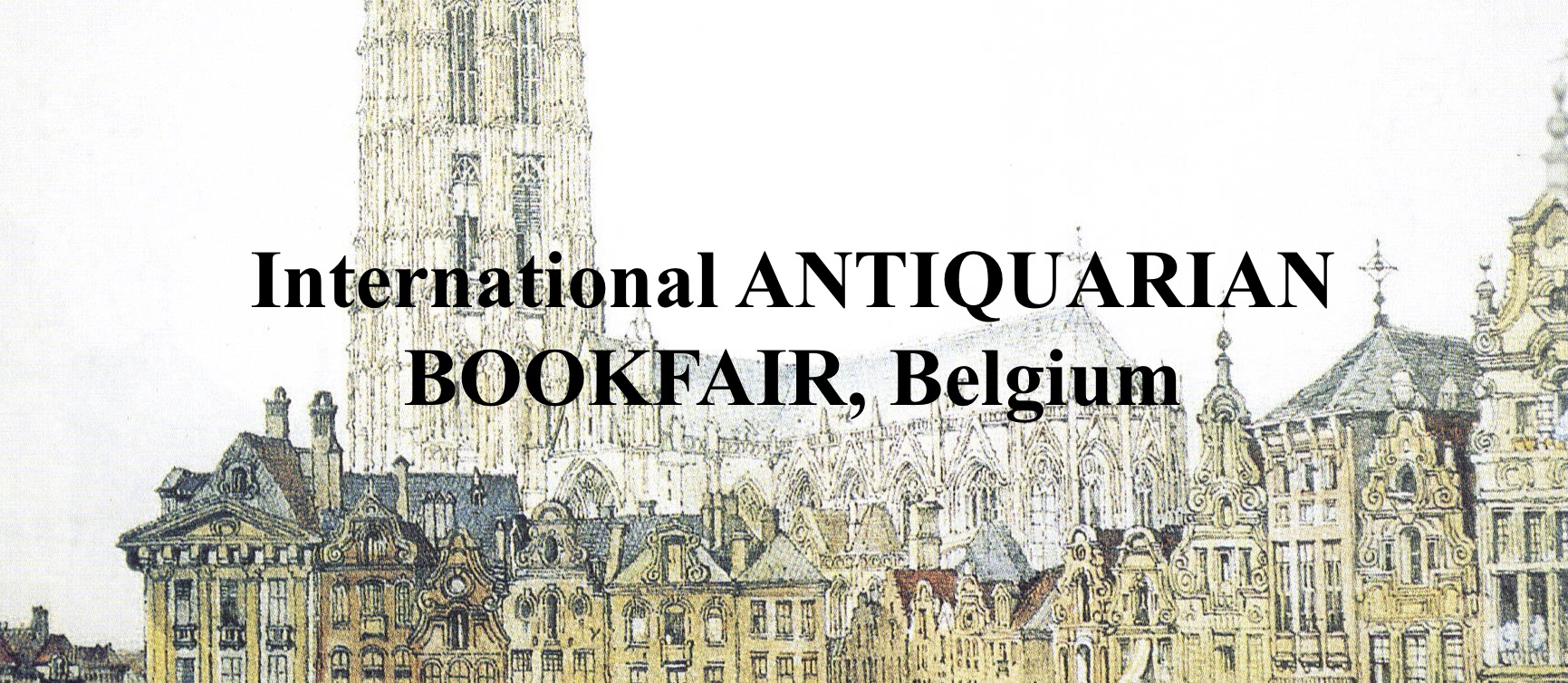
Antiquarenbeurs Mechelen
Exhibitor
Florisatus Fine BooksPlein 19 C
2511 CS Den Haag
Netherlands
Contact
Edwin & Liesbeth BloemsaatPhone
+31 (0) 614 270 027 +31 (0) 614 270 027Website
ilab.org/affiliate/florisatus-fine-books-manuscripts-musicalia
The most beautiful Dutch birdbook
Nederlandsche vogelen; volgens hunne huishouding, aert, en eigenschappen beschreeven door Cornelis Nozeman, alle naer 't leeven geheel nieuw en naeuwkeurig getekend, in 't koper gebragt, en natuuryk gekoleurd door, en onder opzicht van Christiaan Sepp en zoon
Amsterdam, Jan Christiaan Sepp, 1770-1829. Large folio (555 x 385 mm). 5 volumes. [VIII], 1-92; [VI], 93-194, IV; [VI], 195-294; [VI], 295-394, IV; VI, 395-500 p.
With 5 engraved title pages and 250 (2 double page) copper engravings, all beautifully coloured by hand, Vol 5 plate Jan van Gend ad plate Krab Reiger coloured à la poupée.
Uniform half calf. Spine with 6 raised bands, red title label in compartment 2, oval green volume label in compartment 4, gold tooled fillets at the raised bands and head and tail. Yellow "Kiebitzpapier" on the boards.
The most impressive Dutch ornithological work ever published, also the most expensive Dutch book on the market at that time. The sheer size of the 250 meticulously coloured copper engravings impresses already, but it was also a nouveauté at the time that all the birds were newly drawn after life and not copied after elder works. Also new was the depiction of the bird with his eggs and nest, and many times in its natural habitat. Where possible, the birds are real size. Depicted are 192 different bird species found in Holland in those days, sometimes the nests on separate plates.
This 60 years project was started in 1770 by the publishers and engravers Christiaan Sepp (1720-1775) and his son Jan Christiaan Sepp (1739-1811), who also published beautifully illustrated books on Insects, Wood specimina and Marbles. For the text they asked Cornelis Nozeman (1721-1786), a clergyman with a profound interest in nature, who also himself went into the fields looking for birds. The later text writers, Martinus Houttuyn (1720-1798) and especially C.J. Temminck (1778-1858) were studying nature more from behind their desks, which explains that in the later volumes the natural habitat is more in the background. Some of the watercolours for this project survived, but are unsigned. Mostly they are ascribed to Christiaan and Jan Christiaan Sepp, in the prefaces the Rotterdam painter Nicolaes Muys (1740-1808) is several times mentioned, but also the famous German painter Johann Heinrich Wilhelm Tischbein (1751-1829) was in the beginning involved in this project.
-Provenance: Dutch private collection.
-Literature: Marieke van Delft, Esther van Gelder (et al), Nederlandsche vogelen 1770-1829, (KB/ Lannoo 2014), p. 10-21; Nissen, Schöne Vogelbücher, no. 371; Landwehr, Studies in Dutch Books with Coloured Plates, p. 96 & 145; Sitwell, Fine Bird Books, p. 98; Anker, Bird Books, 369; Zimmer, Catalogue of the Edward E. Ayer Ornithological Library, vol. II, p. 469-470.
-Condition: Innerly crisp and clean copy; Vol. 1-3 uncut; Heads and tails worn but not lacking much material; Boards a bit rubbed, 2 boards a bit more and lacking some paper fragments; In all a clean beautifully coloured copy in uniform contemporary bindings.
With 5 engraved title pages and 250 (2 double page) copper engravings, all beautifully coloured by hand, Vol 5 plate Jan van Gend ad plate Krab Reiger coloured à la poupée.
Uniform half calf. Spine with 6 raised bands, red title label in compartment 2, oval green volume label in compartment 4, gold tooled fillets at the raised bands and head and tail. Yellow "Kiebitzpapier" on the boards.
The most impressive Dutch ornithological work ever published, also the most expensive Dutch book on the market at that time. The sheer size of the 250 meticulously coloured copper engravings impresses already, but it was also a nouveauté at the time that all the birds were newly drawn after life and not copied after elder works. Also new was the depiction of the bird with his eggs and nest, and many times in its natural habitat. Where possible, the birds are real size. Depicted are 192 different bird species found in Holland in those days, sometimes the nests on separate plates.
This 60 years project was started in 1770 by the publishers and engravers Christiaan Sepp (1720-1775) and his son Jan Christiaan Sepp (1739-1811), who also published beautifully illustrated books on Insects, Wood specimina and Marbles. For the text they asked Cornelis Nozeman (1721-1786), a clergyman with a profound interest in nature, who also himself went into the fields looking for birds. The later text writers, Martinus Houttuyn (1720-1798) and especially C.J. Temminck (1778-1858) were studying nature more from behind their desks, which explains that in the later volumes the natural habitat is more in the background. Some of the watercolours for this project survived, but are unsigned. Mostly they are ascribed to Christiaan and Jan Christiaan Sepp, in the prefaces the Rotterdam painter Nicolaes Muys (1740-1808) is several times mentioned, but also the famous German painter Johann Heinrich Wilhelm Tischbein (1751-1829) was in the beginning involved in this project.
-Provenance: Dutch private collection.
-Literature: Marieke van Delft, Esther van Gelder (et al), Nederlandsche vogelen 1770-1829, (KB/ Lannoo 2014), p. 10-21; Nissen, Schöne Vogelbücher, no. 371; Landwehr, Studies in Dutch Books with Coloured Plates, p. 96 & 145; Sitwell, Fine Bird Books, p. 98; Anker, Bird Books, 369; Zimmer, Catalogue of the Edward E. Ayer Ornithological Library, vol. II, p. 469-470.
-Condition: Innerly crisp and clean copy; Vol. 1-3 uncut; Heads and tails worn but not lacking much material; Boards a bit rubbed, 2 boards a bit more and lacking some paper fragments; In all a clean beautifully coloured copy in uniform contemporary bindings.
€ 44.000
View exhibitor's highlights
